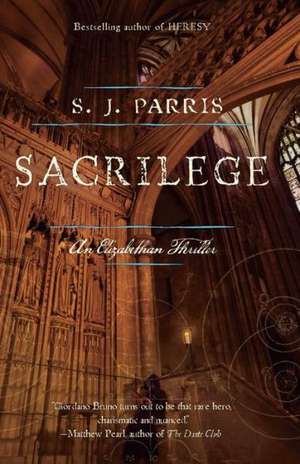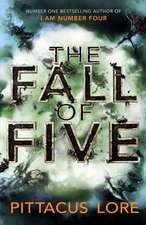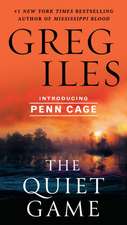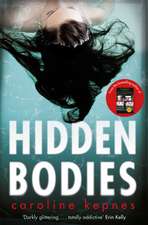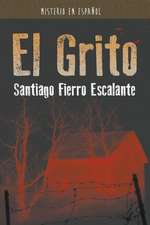Sacrilege
Autor S.J. Parrisen Limba Engleză Paperback – 11 feb 2013
But in the city that was once England’s greatest center of pilgrimage, Bruno uncovers a more dangerous plot in the making, one that forces him to turn his detective’s eye to the strange case of Saint Thomas Becket, a twelfth-century cardinal of Canterbury Cathedral whose mysterious murder is only matched by the legend surrounding the disappearance of his body.
| Toate formatele și edițiile | Preț | Express |
|---|---|---|
| Paperback (2) | 65.11 lei 3-5 săpt. | +14.90 lei 7-13 zile |
| HarperCollins Publishers – 16 aug 2012 | 65.11 lei 3-5 săpt. | +14.90 lei 7-13 zile |
| Anchor Books – 11 feb 2013 | 109.95 lei 3-5 săpt. |
Preț: 109.95 lei
Nou
Puncte Express: 165
Preț estimativ în valută:
21.05€ • 21.69$ • 17.67£
21.05€ • 21.69$ • 17.67£
Carte disponibilă
Livrare economică 01-15 februarie
Preluare comenzi: 021 569.72.76
Specificații
ISBN-13: 9780307947468
ISBN-10: 0307947467
Pagini: 423
Dimensiuni: 138 x 209 x 26 mm
Greutate: 0.32 kg
Editura: Anchor Books
ISBN-10: 0307947467
Pagini: 423
Dimensiuni: 138 x 209 x 26 mm
Greutate: 0.32 kg
Editura: Anchor Books
Notă biografică
S. J. PARRIS is the pseudonym of Stephanie Merritt. Since graduating from Cambridge she has worked as a critic and feature writer for a variety of newspapers and magazines as well as for radio and television. She currently writes for The Observer and The Guardian and is the author of five books.
Extras
Chapter 1
I knew that I was being followed long before I saw or heard my pursuer. I felt it by some instinct that by now had been sharpened by experience; a shifting of the air, a presence whose movements invisibly shadowed my own. Someone was watching me and had been for several days: from the mouths of alleyways, from behind pillars or walls, amid the crowds of people, carts, and animals that thronged the narrow streets of London or out among the river traffic. At times I even sensed eyes on me in the privacy of my room at Salisbury Court, though that was surely impossible and could only have been the tricks of imagination.
It was the twenty-third day of July 1584, and I was hurrying to deliver my new book to my printer before he left London for the rest of the summer. A merchant ship from Portugal had recently docked at Tilbury, at the mouth of the River Thames. Plague was raging in Lisbon and the crew had been forcibly quarantined; despite these measures, rumours that the infection had begun to claim English victims were spreading through the city quicker than the disease itself ever could. Outbreaks of plague were common enough during London summers, I had been told, and any Londoner with the means to move to healthier air was packing as fast as they could. At the French embassy, where I lived as the ambassador's houseguest, whispers of the black plague had sent the household into such a frenzy of imagined symptoms that the ambassador had dispatched his private secretary to enquire about country houses in the neighbourhood of the Palace of Nonsuch, Queen Elizabeth of England's summer residence.
Fear of the plague had only added to tensions at the embassy in the past few days. Our peace had been shattered the previous week by the arrival of the news from the Netherlands that William the Silent, Prince of Orange, had been assassinated, shot in the chest on the staircase of his own house in Delft by a man he knew and trusted. I imagined that in all the embassies of the Catholic and Protestant powers throughout the greatest cities of Europe, men and women would be standing much as we did when the messenger arrived, speechless in the face of an act whose repercussions would shake the world as we knew it. The shock and fear occasioned by the deed were still palpable in the streets of London; not that the English people gave two figs for William himself, but it was well known that the Catholic King Philip II of Spain had offered a reward of twenty-five thousand crowns for his murder. And if one Protestant ruler could be knocked down as easily as a skittle, there was no doubt that Queen Elizabeth of England would be next on Philip's list. The sense of foreboding was all the greater at Salisbury Court because William's assassin had been a Frenchman.
John Charlewood, my printer, had his lodgings at the Half-Eagle and Key in the street known as Barbican, just to the north of the city wall. He also had a press nearby at the Charterhouse, the old Carthusian monastery which had been converted into a grand private residence, but I refused to visit his business premises; the Charterhouse was now owned by Thomas Howard, half brother to the young Earl of Arundel. I had made enemies of the Howards-the most powerful Catholic family among the English nobility-the previous autumn and preferred to avoid the possibility of running into any one of them. This amused Charlewood, but he never asked questions; he was sufficiently eccentric himself to tolerate the apparent caprices of others, or else shrewd enough to realise that, in these days of tangled loyalties, it is often safer not to know another man's business.
The sun was already high when I set out from Salisbury Court with a leather satchel containing my manuscript pages slung around my back. Sharp diamonds of light glinted from the windows of the buildings on Fleet Street, mostly printers and taverns that served the nearby law courts. As I walked, my feet scuffed up clouds of dust from the cobbles; occasionally I had to step aside to avoid a heap of fresh horse dung, but elsewhere the heat had hardened older piles into dry, straw-scattered crusts. The smell of rotting refuse and the sewage stink of the Thames weighed down in the still air; I pressed the sleeve of my linen shirt over my nose and tried to breathe through my mouth. The sun beat hard on a street that was curiously quiet. The law terms had finished now, so Fleet Street was missing the bustle of the Inns of Court, yet one would have expected more traffic on the main thoroughfare from Westminster to the City of London. I glanced around. Perhaps people were staying indoors for fear of the plague; perhaps they had all left for the countryside already, and the few souls remaining at the embassy were unwittingly living in a ghost town. This thought made me impatient; life was so fraught with natural hazards and those we invite on our own heads that if you were to spend your life hiding from the prospect of trouble, you would never leave your chamber. I should know, having spent the past eight years on the run through Europe with danger's cold breath constantly at my neck, ever since the night I fled from my monastery in Naples to escape the attention of the Inquisition. Yet my life had been fuller, more vivid, and infinitely more precious to me during those eight years, when I had come close to losing it several times, than in the thirteen years I had lived safe inside the sacred walls of San Domenico Maggiore.
I had just crossed Fleet Street and turned into Shoe Lane when I saw it: a disturbance at the edge of vision, brief as a blink, and then it was gone. I whipped around, my hand flying to the hilt of the bone-handled dagger I had carried at my belt since the night I became a fugitive, but the lane was almost empty. Only an old woman in a thin smock walked towards me, her back bent under the weight of her basket. She chanced to glance up at that moment and, seeing me apparently reaching for my knife, dropped her goods and let out a scream that echoed across the river to Southwark and back.
"No, no-good madam, don't be alarmed." I held my hands out, palms upwards, to show my innocence, but hearing my accent only made things worse; she stood rooted to the spot, shrieking all the louder about murdering Spanish papists. I tried to make soothing noises to quieten her, but her cries grew more frenzied, until the door of a neighbouring house opened and two men emerged, blinking in the strong light.
"What gives here?" The taller glared at me from beneath one thick eyebrow. "Are you all right, goodwife?"
"He went for his knife, the filthy Spanish dog," she gasped, clutching at her chest for good measure. "He meant to cut out my heart and rob me blind, I swear it!"
"I am sorry to have caused you any alarm." I held up my empty hands for the men to examine. "I thought I heard someone following me, that is all." I glanced up and down the street but there was no sign of movement apart from the shimmering heat haze that hovered over the ground up ahead.
"Oh yeah?" He tilted his chin at me and gave a little swagger. "Likely story. What business have you here, you Spanish whoreson?"
"Stand back, Gil, he might be one of them with the plague," his companion said, half hovering behind the big man's shoulder.
"Have you come here bringing plague on us, you filth?" the man named Gil demanded, his voice harder, but he took a step back nonetheless.
I sighed. Most Englishmen, I have discovered, know of only two other nations, Spain and France, which their mothers used interchangeably to frighten them as children. This year it was the turn of the Spanish. With my dark hair and eyes and my strange accent, I found myself accused several times a week of wanting to murder honest English folk in their beds in the name of the pope, often while I was simply walking down the street. In some ways, London was the most tolerant city I had ever had the good fortune to visit, but when it came to foreigners, these islanders were the most suspicious people on earth.
"You are thinking of the Portuguese. I am neither Spanish nor Portuguese-I am Italian," I said, with as much dignity as I could muster. "Giordano Bruno of Nola, at your service."
"Then why don't you go back there!" said the rat-faced fellow, glancing up at his friend for approval.
"Aye. Why do you come to London-to murder us and make us bow down to the pope?"
"I could not very well do both, even if I wanted," I said, and quickly saw that humour was not the means to disarm him. "Listen, good sirs-I meant no offence to anyone. May we all now go on our way?"
They exchanged a glance.
"Aye, we may . . ." said the big man, and for a moment I breathed a sigh of relief. "When we have taught you a lesson."
He thumped one meaty fist into the palm of his other hand; his friend cackled nastily and cracked his knuckles. With a reflex quick as blinking, my knife was out again and pointed at them before either of them had even stepped forward. I did not spend three years on the road in Italy without learning how to defend myself.
"Gentlemen," I said, keeping my eyes fixed on them both as I shifted my weight onto my toes, primed to run if need be. "I am a resident of the embassy of France and as such a guest of Queen Elizabeth in your country and under her protection. If you lay a finger on me, you will answer directly to Her Majesty's ministers. And they will know where to find you." I nodded towards the house behind them.
They looked uneasily at each other. The smaller one appeared to be waiting for his companion's verdict. Finally the bigger man lowered his hands and took a pace back.
"Piss off then, you pope-loving shit. But stay away from this street in future, if you have a care for your pretty face."
Relieved, I sheathed my knife, nodded, straightened my shoulders, and walked on, bowing slightly to the old woman, who had stooped to gather up her fallen wares. I almost offered to help, but the force of her glare was enough to keep me moving on. I had barely walked ten paces when something whistled past my left ear and clattered onto the ground; I leapt aside; just ahead of me a stone the size of a man's fist was rolling to a standstill in the dust. Whipping around, I saw the two men cackling as they stood together, legs planted firmly astride, arms folded. With more bravado than I felt, I seized my knife again and made as if to come back for them; they faltered for a moment, then the smaller one tugged his friend by the sleeve and both retreated hastily into their house.
I put away the knife once more, wiping the sweat from my upper lip. My hands were shaking and I could feel my heart hammering under my ribs; those two louts had meant to frighten me, but they could not have known how well they had succeeded. Last autumn, I had almost been killed by just such an attack, a rock hurled at my head with no warning, out of the night. If I had become more skittish since then, it was not without reason. I looked around, still taut with fear, one hand laid protectively over my bag. The old woman had almost reached the far end of the street; otherwise there was no sign of life. But I thought I knew who was stalking me through the streets of London; I had been half expecting him since last year. And if I was right, he would not be satisfied until I was dead.
I knew that I was being followed long before I saw or heard my pursuer. I felt it by some instinct that by now had been sharpened by experience; a shifting of the air, a presence whose movements invisibly shadowed my own. Someone was watching me and had been for several days: from the mouths of alleyways, from behind pillars or walls, amid the crowds of people, carts, and animals that thronged the narrow streets of London or out among the river traffic. At times I even sensed eyes on me in the privacy of my room at Salisbury Court, though that was surely impossible and could only have been the tricks of imagination.
It was the twenty-third day of July 1584, and I was hurrying to deliver my new book to my printer before he left London for the rest of the summer. A merchant ship from Portugal had recently docked at Tilbury, at the mouth of the River Thames. Plague was raging in Lisbon and the crew had been forcibly quarantined; despite these measures, rumours that the infection had begun to claim English victims were spreading through the city quicker than the disease itself ever could. Outbreaks of plague were common enough during London summers, I had been told, and any Londoner with the means to move to healthier air was packing as fast as they could. At the French embassy, where I lived as the ambassador's houseguest, whispers of the black plague had sent the household into such a frenzy of imagined symptoms that the ambassador had dispatched his private secretary to enquire about country houses in the neighbourhood of the Palace of Nonsuch, Queen Elizabeth of England's summer residence.
Fear of the plague had only added to tensions at the embassy in the past few days. Our peace had been shattered the previous week by the arrival of the news from the Netherlands that William the Silent, Prince of Orange, had been assassinated, shot in the chest on the staircase of his own house in Delft by a man he knew and trusted. I imagined that in all the embassies of the Catholic and Protestant powers throughout the greatest cities of Europe, men and women would be standing much as we did when the messenger arrived, speechless in the face of an act whose repercussions would shake the world as we knew it. The shock and fear occasioned by the deed were still palpable in the streets of London; not that the English people gave two figs for William himself, but it was well known that the Catholic King Philip II of Spain had offered a reward of twenty-five thousand crowns for his murder. And if one Protestant ruler could be knocked down as easily as a skittle, there was no doubt that Queen Elizabeth of England would be next on Philip's list. The sense of foreboding was all the greater at Salisbury Court because William's assassin had been a Frenchman.
John Charlewood, my printer, had his lodgings at the Half-Eagle and Key in the street known as Barbican, just to the north of the city wall. He also had a press nearby at the Charterhouse, the old Carthusian monastery which had been converted into a grand private residence, but I refused to visit his business premises; the Charterhouse was now owned by Thomas Howard, half brother to the young Earl of Arundel. I had made enemies of the Howards-the most powerful Catholic family among the English nobility-the previous autumn and preferred to avoid the possibility of running into any one of them. This amused Charlewood, but he never asked questions; he was sufficiently eccentric himself to tolerate the apparent caprices of others, or else shrewd enough to realise that, in these days of tangled loyalties, it is often safer not to know another man's business.
The sun was already high when I set out from Salisbury Court with a leather satchel containing my manuscript pages slung around my back. Sharp diamonds of light glinted from the windows of the buildings on Fleet Street, mostly printers and taverns that served the nearby law courts. As I walked, my feet scuffed up clouds of dust from the cobbles; occasionally I had to step aside to avoid a heap of fresh horse dung, but elsewhere the heat had hardened older piles into dry, straw-scattered crusts. The smell of rotting refuse and the sewage stink of the Thames weighed down in the still air; I pressed the sleeve of my linen shirt over my nose and tried to breathe through my mouth. The sun beat hard on a street that was curiously quiet. The law terms had finished now, so Fleet Street was missing the bustle of the Inns of Court, yet one would have expected more traffic on the main thoroughfare from Westminster to the City of London. I glanced around. Perhaps people were staying indoors for fear of the plague; perhaps they had all left for the countryside already, and the few souls remaining at the embassy were unwittingly living in a ghost town. This thought made me impatient; life was so fraught with natural hazards and those we invite on our own heads that if you were to spend your life hiding from the prospect of trouble, you would never leave your chamber. I should know, having spent the past eight years on the run through Europe with danger's cold breath constantly at my neck, ever since the night I fled from my monastery in Naples to escape the attention of the Inquisition. Yet my life had been fuller, more vivid, and infinitely more precious to me during those eight years, when I had come close to losing it several times, than in the thirteen years I had lived safe inside the sacred walls of San Domenico Maggiore.
I had just crossed Fleet Street and turned into Shoe Lane when I saw it: a disturbance at the edge of vision, brief as a blink, and then it was gone. I whipped around, my hand flying to the hilt of the bone-handled dagger I had carried at my belt since the night I became a fugitive, but the lane was almost empty. Only an old woman in a thin smock walked towards me, her back bent under the weight of her basket. She chanced to glance up at that moment and, seeing me apparently reaching for my knife, dropped her goods and let out a scream that echoed across the river to Southwark and back.
"No, no-good madam, don't be alarmed." I held my hands out, palms upwards, to show my innocence, but hearing my accent only made things worse; she stood rooted to the spot, shrieking all the louder about murdering Spanish papists. I tried to make soothing noises to quieten her, but her cries grew more frenzied, until the door of a neighbouring house opened and two men emerged, blinking in the strong light.
"What gives here?" The taller glared at me from beneath one thick eyebrow. "Are you all right, goodwife?"
"He went for his knife, the filthy Spanish dog," she gasped, clutching at her chest for good measure. "He meant to cut out my heart and rob me blind, I swear it!"
"I am sorry to have caused you any alarm." I held up my empty hands for the men to examine. "I thought I heard someone following me, that is all." I glanced up and down the street but there was no sign of movement apart from the shimmering heat haze that hovered over the ground up ahead.
"Oh yeah?" He tilted his chin at me and gave a little swagger. "Likely story. What business have you here, you Spanish whoreson?"
"Stand back, Gil, he might be one of them with the plague," his companion said, half hovering behind the big man's shoulder.
"Have you come here bringing plague on us, you filth?" the man named Gil demanded, his voice harder, but he took a step back nonetheless.
I sighed. Most Englishmen, I have discovered, know of only two other nations, Spain and France, which their mothers used interchangeably to frighten them as children. This year it was the turn of the Spanish. With my dark hair and eyes and my strange accent, I found myself accused several times a week of wanting to murder honest English folk in their beds in the name of the pope, often while I was simply walking down the street. In some ways, London was the most tolerant city I had ever had the good fortune to visit, but when it came to foreigners, these islanders were the most suspicious people on earth.
"You are thinking of the Portuguese. I am neither Spanish nor Portuguese-I am Italian," I said, with as much dignity as I could muster. "Giordano Bruno of Nola, at your service."
"Then why don't you go back there!" said the rat-faced fellow, glancing up at his friend for approval.
"Aye. Why do you come to London-to murder us and make us bow down to the pope?"
"I could not very well do both, even if I wanted," I said, and quickly saw that humour was not the means to disarm him. "Listen, good sirs-I meant no offence to anyone. May we all now go on our way?"
They exchanged a glance.
"Aye, we may . . ." said the big man, and for a moment I breathed a sigh of relief. "When we have taught you a lesson."
He thumped one meaty fist into the palm of his other hand; his friend cackled nastily and cracked his knuckles. With a reflex quick as blinking, my knife was out again and pointed at them before either of them had even stepped forward. I did not spend three years on the road in Italy without learning how to defend myself.
"Gentlemen," I said, keeping my eyes fixed on them both as I shifted my weight onto my toes, primed to run if need be. "I am a resident of the embassy of France and as such a guest of Queen Elizabeth in your country and under her protection. If you lay a finger on me, you will answer directly to Her Majesty's ministers. And they will know where to find you." I nodded towards the house behind them.
They looked uneasily at each other. The smaller one appeared to be waiting for his companion's verdict. Finally the bigger man lowered his hands and took a pace back.
"Piss off then, you pope-loving shit. But stay away from this street in future, if you have a care for your pretty face."
Relieved, I sheathed my knife, nodded, straightened my shoulders, and walked on, bowing slightly to the old woman, who had stooped to gather up her fallen wares. I almost offered to help, but the force of her glare was enough to keep me moving on. I had barely walked ten paces when something whistled past my left ear and clattered onto the ground; I leapt aside; just ahead of me a stone the size of a man's fist was rolling to a standstill in the dust. Whipping around, I saw the two men cackling as they stood together, legs planted firmly astride, arms folded. With more bravado than I felt, I seized my knife again and made as if to come back for them; they faltered for a moment, then the smaller one tugged his friend by the sleeve and both retreated hastily into their house.
I put away the knife once more, wiping the sweat from my upper lip. My hands were shaking and I could feel my heart hammering under my ribs; those two louts had meant to frighten me, but they could not have known how well they had succeeded. Last autumn, I had almost been killed by just such an attack, a rock hurled at my head with no warning, out of the night. If I had become more skittish since then, it was not without reason. I looked around, still taut with fear, one hand laid protectively over my bag. The old woman had almost reached the far end of the street; otherwise there was no sign of life. But I thought I knew who was stalking me through the streets of London; I had been half expecting him since last year. And if I was right, he would not be satisfied until I was dead.
Recenzii
“Reinforces Parris’s position at the top of the Elizabethan historical pack. . . . Parris . . . masterfully mixes political intrigue, action, and sleuthing.” —Publishers Weekly (starred review)
“Giordano Bruno turns out to be that rare hero, charismatic and nuanced.” —Matthew Pearl, author of The Dante Club
“A feast for fans of historical thrillers. . . . [Bruno] is one of the most engaging characters ever created.” —Bookreporter
“Move over C. J. Sansom, S.J. Parris has arrived. . . . Brilliant.” —The Globe and Mail (Toronto)
“Bruno commands our attention and our sympathy as any likable heretic should.” —The Washington Post Book World
“The novel's fast pace and numerous twists keep readers hooked until the end.” —Booklist
“The politics of Elizabethan England play a part, but it’s the personal relationships that are front and center. A good read.” —The Free Lance-Star (Fredericksburg, VA)
“Parris provides a sumptuously rich setting with an absorbing entangled plotline that will keep the reader on a precipice of sudden death.” —Historical Novels Review
“Enjoyably ingenious.” —The Sunday Times (London)
“Giordano Bruno turns out to be that rare hero, charismatic and nuanced.” —Matthew Pearl, author of The Dante Club
“A feast for fans of historical thrillers. . . . [Bruno] is one of the most engaging characters ever created.” —Bookreporter
“Move over C. J. Sansom, S.J. Parris has arrived. . . . Brilliant.” —The Globe and Mail (Toronto)
“Bruno commands our attention and our sympathy as any likable heretic should.” —The Washington Post Book World
“The novel's fast pace and numerous twists keep readers hooked until the end.” —Booklist
“The politics of Elizabethan England play a part, but it’s the personal relationships that are front and center. A good read.” —The Free Lance-Star (Fredericksburg, VA)
“Parris provides a sumptuously rich setting with an absorbing entangled plotline that will keep the reader on a precipice of sudden death.” —Historical Novels Review
“Enjoyably ingenious.” —The Sunday Times (London)
Descriere
A gripping historical thriller set in 16th-century England and centered on the highly secretive cult of Saint Thomas Becket, the 12th-century archbishop murdered in Canterbury Cathedral.
